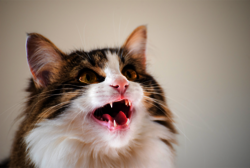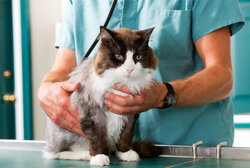Having your cat vaccinated
Kittens should be given a number of vaccinations at an early age in order to build up good protection. We will show you what vaccinations are recommended for cats, from what age and how often they should be given, and how much they will cost.
What vaccinations do cats require?
In most countries, no vaccinations are required by law for cats. In Germany, vets usually follow the recommendations of the Standing Commission on Vaccination in Veterinary Medicine. The experts involved here provide updates on the vaccination situation at regular intervals. They distinguish between vaccinations that are recommended for all cats and those that are only required for certain pets (for example cats that are allowed outdoors) or specific situations (for example areas with an increased prevalence of a particular virus or disease).
Vaccinations recommended for all cats:
- Feline panleukopenia (FP)
Feline panleukopenia (also known as feline distemper) is a viral disease that is highly contagious. For unvaccinated kittens, the disease can be fatal. Typical symptoms are fatigue, fever, diarrhoea and vomiting. Treatment is carried out with antibiotics and infusions.
- Cat flu
This is not simply flu as we know it, but a disease that can be particularly severe in younger animals. Affected cats have sticky eyes, sneeze frequently and feel very groggy. They are given antibiotics and medication to strengthen the immune system.
Other vaccinations sometimes recommended:
- Rabies
Germany has been classified as rabies-free since 2008. Vaccination against rabies is, however, still recommended for cats that are allowed outdoors, because there is still a small risk of being bitten by an animal that may be infected. Ask your vet for advice. A rabies vaccination is not normally considered necessary for indoor cats. Please note, however, that some boarding catteries require this vaccination and that it is often compulsory when entering another country.
- FIP (feline infectious peritonitis)
This is a viral disease from the coronavirus group that occurs worldwide. The peritonitis is noticeable through a reluctance to eat, fever and weight loss. The affected cat will often have a build-up of fluid in its abdomen. An antibody test can help to detect coronaviruses, but not whether they will cause FIP. Luckily, the likelihood is only about five to ten percent. If it does, however, occur, there is no known cure.
- Feline leukaemia virus (FeLV)
For cats that are allowed outdoors and have frequent contact with other animals, vets often recommend vaccination against feline leukaemia (also known as feline leucosis). The virus is transmitted directly from cat to cat, for example when they lick each other. Many cats are able to live with the disease without any problems. It can, however, also lead to weight loss and inflammation of the gums.
When should cats receive their first vaccinations?
In the first weeks of their lives, kittens are very well protected against infections by the antibodies in their mother’s milk. However, from approximately the 8th week, this natural protection starts to steadily decrease. The problem is that this does not always occur at exactly the same time and with the same speed. There is therefore no specific date for vaccinating kittens in order to provide them with maximum protection against viruses and bacteria. A transitional period is necessary, because the problem is also that as long as the natural protection is more or less still present, it is not possible to build up comprehensive new protection by means of vaccination. In order to overcome the problem of diminishing natural protection and the need for new protection by means of vaccinations, the German Standing Committee on Vaccination in Veterinary Medicine (StIKo Vet) recommends vaccination three times a year at relatively short intervals: The first vaccination is given in the 8th week of the pet’s life, followed by two boosters in the 12th and 16th week. The basic immunisation is then completed with a further vaccination in the 15th month.
How much does a vaccination cost?
While some countries regulate the costs of vaccinations, the price will usually vary from practice to practice and will depend on what type of vaccination your pet is given. Additional services such as general health checks and the issuing of an animal health certificate or a pet passport will involve additional costs. It is therefore only possible to calculate a rough average price for cat vaccinations.
For basic immunisation, costs may be around 40 to 60 Euros per vaccination. Because kittens receive three vaccinations and a fourth one at approximately 15 months of age, the total costs may range from 160 to 240 Euros. This also depends on whether a rabies vaccination and/or other vaccinations are required. Here, the costs will increase accordingly.
How often does a cat need to be vaccinated?
Nobody wants to have their cat vaccinated more often than necessary. It is, however, not advisable to leave out a vaccination. Especially when it comes to basic immunisation, insufficient vaccination could result in less than optimal protection. How often a cat needs to be vaccinated after that depends on the individual vaccines. An annual booster may be necessary, but an interval of three years may also be sufficient. Your vet will advise you on this and can write down the scheduled date in the vaccination certificate. Some vets will also send you a postcard or a text message as a reminder.
If you are worried about over-vaccinating your cat, a so-called titre test can be performed regularly to check its level of antibodies. This test will show how high the level of vaccination protection still is. If this protection is sufficient, a booster vaccination can be avoided for the time being.
What side effects can vaccinations have?
The serum of a vaccine contains weakened or inactivated pathogens of the respective disease. The symptoms may therefore appear in a weakened form. The body then begins to render these unwanted invaders harmless. To do this, antibodies are formed or immune cells are activated. As soon as the pathogen has been successfully eliminated, this information is stored by means of “memory cells”. Should an infection actually occur, the body is able to react very quickly and much more effectively than if this were the initial contact.
Side effects from vaccinations are extremely rare, however they cannot be ruled out. For example, a slight swelling at the injection site may occur. This can easily last for several days. Some cats may appear weak and tired for one to three days and may be less hungry than usual. This will usually go away on its own. It is also possible that symptoms of the diseases will appear in a weakened form, for example a slight fever, sneezing or temporary gastrointestinal problems.
Apart from some minor side effects, in very rare cases an allergic reaction to the vaccine may occur. This can happen after just several minutes or a few hours after the injection. Symptoms include breathing problems and vomiting. The cat must then immediately be brought back to the vet.
Tip:
Despite the possible side effects, it is advisable to vaccinate especially cats that are allowed outside. If left unvaccinated, there is a high risk that they will quickly become infected by other animals, and this could affect their life expectancy, which is in any case usually shorter than that of indoor cats.
You may also like this

Ticks on cats
How to safely remove ticks from your cat

The right cat first aid kit
Our checklist shows which items are essential

Dental care for cats
This is what a dental care of your cat can look like

Blood pressure in cats
Measuring blood pressure reveals the efficiency of the heart
